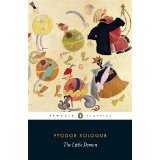I have to be honest, I struggled with this book. It’s a shame because Sologub came so highly recommended; I fully accept that my attitude is due to my own lack of good taste / issues with translation.
This book sounded like it would have it all. As it says on the blurb: ‘mad, lascivious, sadistic and ridiculous, the provincial school teacher Peredonov torments his students and has hallucinatory fantasies about acts of savagery, yet to everyone else he is an upstanding member of society…this grotesque mirror of a spiritually bankrupt society is arguably the finest Russian novel to have come out of the Symbolist movement.
I was hoping for another Little Judas of ‘The Golgolyov Family’ combined with some of the horror of Andreyev. Somehow it didn’t work out for me and I’m still not sure if this is because I don’t like Sologub, I don’t like symbolism or I just couldn’t find my way into this translation. Peredonov is truly horrible, but I don’t think I ever believed in him. This could just be my good fortune, I don’t think I’ve ever met anyone so odd, but it did mean that I was left cold by much of the action. Peredonov is extremely stupid, when told some gossip in the first chapter he ‘pondered for a moment and then burst out laughing. He did not always immediately react to what was funny as his brain worked slowly, sluggishly‘. There’s something about the characterisation and the explanatory prose that alienates me and stops me from finding Peredonov interesting and I think this is a problem because I’m sure he’s supposed to be interesting.
His stupidity is such that it took me a while to work out that his paranoia was, in fact, a separate character trait. As the book progresses, the madness increases and I finally found myself getting carried away with the prose:
‘he wrote denunciations not only of people but of the four queens in the pack of cards. As soon as he had finished he would take his reports straight to the district police officer. All his evenings were spent in this way. Everywhere he looked he could see kings, queens and jacks strutting about like real people. Even the humbler cards took to parading themselves…Sometimes the cards turned into people he knew, and sometimes living people mingled with these weird spectres.
Peredonov was convinced that the jack of clubs was hiding behind the door and that it had the power and authority of a policeman and could whisk him away somewhere, perhaps to some grim gaol. And beneath the table sat the little demon. Peredonov was too scared to look there – or behind the door…’
The hallucinations work well and gave me an insight into why this book is so popular, but they are hundreds of pages in to the novel and Andreyev conveyed this much insanity in short stories.
So much for the madness. This book also contains a lot of violence, a huge amount of violent if, like me, you read the ‘textual variations’ which were included in the back of my edition and give about 30 extra pages of descriptions of beatings. Women get beaten, boys get beaten, men get beaten. It’s really a matter of taste, but can’t say it added to my enjoyment of the novel. It enabled me build up my picture of the violence of contemporary life, but I wasn’t helped by the feeling that these descriptions were supposed to be humorous (like the beatings in Don Quixote). I think, in general, I’d recommend skipping the ‘textual variations’ if they’re included in your edition…
My research had also pointed to a fin de siècle decadence in Sologub. Given a major part of the plot is the town’s attempts to marry Peredonov to their various female dependants there is a lot of opportunity for sexual shenanigans. These are done best in a sub-plot involving an unmarried woman and a pretty, effeminate school boy. I almost felt like this could have been a novel in it’s own right … then I remembered that it was, in Zola’s La Curée. I don’t want to accuse Sologub of being derivative, what he does is different, and much more comic, but given the choice I’d always choose to re-read Zola’s treatment of this set up. It’s not great praise to find yourself constantly reminded of a book you’d rather be reading when in the midst of descriptions of illicit love.
Peredonov is not going to join Little Judas in my top Russian villains and Sologub is not going to be a writer I rave about. This book was very popular though and is a reminder that, while I’ve loved so many of the writers I’ve covered in this project so far, I can’t pretend to ever really identify with the tastes and habits of an early twentieth century Russian reader. I do promise to give the Symbolists another try though, and I’ll be reading Bely’s ‘Petersburg’ later this autumn.



